‘We almost faced an undeclared cyberwarfare’
Tatarstan sums up the Year of Digitalisation: the Internet in remote villages, a deficit of staff and a new ICL plant
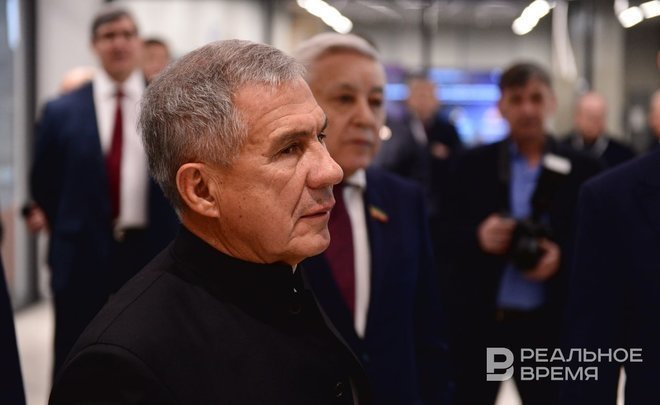
The Tatarstan president backs ICL company from Tatarstan that asked for federal preferential loans to develop Russian software. The support for IT companies was discussed at a meeting of the Tatarstan Ministry of Digitalisation. Rustam Minnikhanov was also inspired by practical results of Safe City project whose cameras stop criminals and approved the construction of a new building of an IT and communications college in Kazan.
IT industry after 24 February: first drafts
“80% of foreign software have Russian analogues,” Tatarstan Minister of Digitalisation Ayrat Khayrullin assured the audience with enviable confidence when delivering a speech at the government’s meeting at the Rameyev IT Park at the heart of Kazan. On 26 January, President Rustam Minnikhanov listened to a report of the minister of digital development in 2022, which was declared the Year of Digitalisation in Tatarstan. The special status of the meeting obliged all ministers and agency directors at the extended meeting of the government.
Ayrat Khayrullin diplomatically bypassed that nearly 80% of foreign companies had left the Russian IT market with the start of the special military operation and focused on how businesses in the republic would have to readjust after the exit of foreign players. But first, he provided a general characteristic of the situation. According to him, the number of IT companies grew — to 3,049 (+95 new companies), and the biggest growth is in Innopolis Special Economic Zone. The IT industry’s revenue rose to 150 billion rubles, the minister said.
In a word, these are the main results of the sector. Investments in the development of mobile network in Tatarstan totalled 1,6 billion rubles, the creation of new state infrastructural IT projects was supported for 3,5 billion rubles, 48 Tatarstan companies received 740 million rubles of financial assistance, there was created a united digital platform of the Republic of Tatarstan that has already allowed reducing costs on the development of electronic services fourfold and the launch term fivefold.
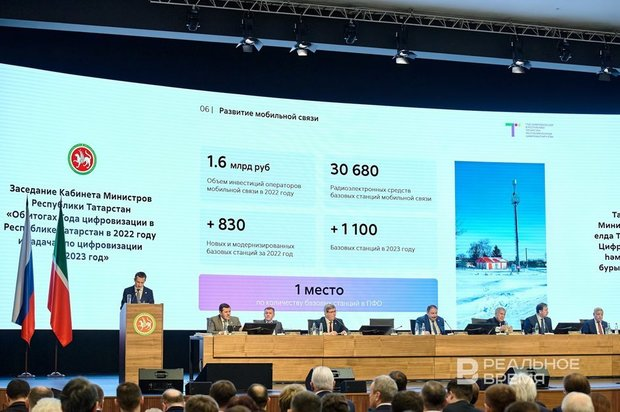
The ministry’s special pride is a wide coverage of broadband Internet in the republic. In big cities and municipal centres it reaches 79%, but it is not enough in the countryside. To cope with the unfairness, Ayrat Khayrullin offered to launch an Internet connection programme in settlements with a population from 300 to 500 people.
Equipment sharing, or how mobile operators should update stations
At the same time, the minister expressed his concern over the coverage of mobile network along roads. For this, mobile operators will have to buy 350 basic stations and modernise another 750. Khayrullin says that MTS installed 10 stations along M 7 highway, which is not enough, whereas Vympelkom will have to equip the Kazan — Almetyevsk — Bavly highway. But can the stations be purchased from Western suppliers like mobile operators have always done? As a possible solution, Ayrat Khayrullin offered the companies to “equipment sharing.” However, there won’t concessions when transferring overhead networks underground. The minister demonstrated the tasks of who and how much managed to transfer them. MTS turned out to be the leader — 61,8 km.
The Safe City project envisaging equipping the urban space with CCTV cameras will have a new lease of life. They have been installed in Kazan until now. In 2023, the number of cameras will increase in nine big cities of the republic (to 1,127). A total of 99,000 CCTV cameras function in Tatarstan thanks to which most crimes are solved.
Ayrat Khayrullin is concerned about a shortage of staff: the republic annually needs about 10,000 specialists, while the number of graduates is twice smaller. For accelerated staff training, he offered to build a new building of the IT and communications college in Kazan.
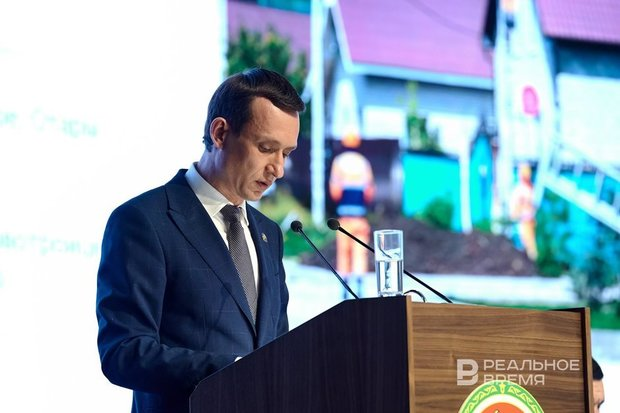
In conditions of undeclared cyberwarfare
Protection from cyberattacks on IT infrastructure went to the forefront for most Tatarstan companies last year. Ayrat Khayrullin said that last year the Cyberattack Prevention Centre prevented 380,000 incidents — 10 times more than in 2021. Precisely the timely creation of the centre in the republic allowed impeding DDoS attacks without interrupting information infrastructure, he noted.
Moreover, the range of attacks turned out to be endless, therefore it is impossible to cope with modern cyber attacks without special protective solutions, head of Innostage Aydar Guzairov explained later:
“We almost faced an undeclared cyberwarfare because last year about 10% of all global attacks were aimed at Russia’s cyber space. It seems to me that it is no secret that the goal of these attacks is to wreck as big havoc as possible. There is a big number off Ukrainian and pro-Ukrainian Telegram channels where an army of hackers is recruited. Perhaps, not all of them are professional hackers, but these Telegram channels simply explains what to do for a DDos attack. So anybody could follow the instructions and start attacking Internet resources,” he said.
However, the activity of cyber criminals notably decreased when Ukrainian energy infrastructure started to have problems in September. A new boom was by the end of the year but they became targeted and specialised. Moreover, attacks were made even on New Year’s Eve, the speaker noted. Innostage specialists were included to the quick response team of the Russian Ministry of Digital Development, and they turned out to be the only non-Moscow company.
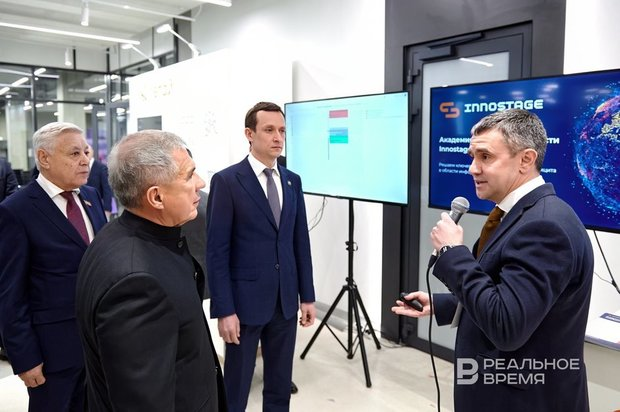
In the conditions of the undeclared cyberwarfare, Innostage trained specialists to cope with hackers in real time. While there is a handful of companies with similar competencies.
Head of BARS Group Timur Akhmerov agreed that all regions had to pay more attention to cyber security of the public information system:
“This issue was raised at federal level. Of course, such incidents happen, but we set up protection in our information systems. Our platform is based on software solutions. We pay a lot of attention to regulating tasks in the security system, do our best for the normal operation of resources, which allows avoiding incidents.”
Amid the exit of foreign giants, Innopolis showed an unseen rise in revenue. According to Roman Shaykhutdinov’s forecast, the revenue of all 542 companies will be more than 39 billion rubles. It is 36,5% more than in 2021. “But federal funding increased the most, by 65%, to 7,34 billion rubles,” the vice premier specified. The revenue of residents and partner companies of Innopolis SEZ rose even more — over 58 billion rubles.
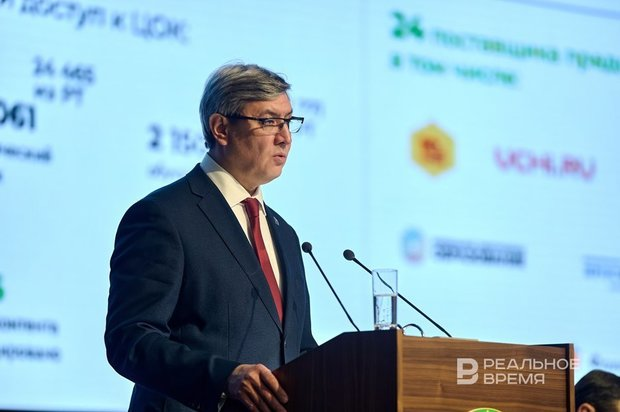
Rosenergoatom manages to build the first rack
The launch of the first stage of Innopolis Data Processing and Storage Centre will become an important event this year. It is built by Rosenergoatom, the capacity is 1,000 racks.
“Rosenergoatom completed the design and started to build the Data Processing and Storage Centre in Innopolis in 2022,” Roman Shaykhutdinov said. “The first of two blocks on an area of 7,500 square metres for 1,000 racks is expected to be launched this December. The company is already receiving applications and holding talks with potential users to provide resources of the centre.”
Rosenergoatom is in the top 10 biggest operators of the Data Processing and Storage Centre in Russia. It controls Xelent, one of the largest data centres of Saint Petersburg for 954 racks and StoreDAta for 160 racks in Moscow, which will be specialised on customised services for clients. Last year, IT Park, Stack Kazan, TISBI Administration University signed agreements on 500 racks for their own needs last year.
Viktor Diachkov: no available loans
During his speech, Board Chairman of ICL Viktor Diachkov said that it wasn’t possible to quickly occupy vacant niches to replace foreign software:
“We are investing in the development of software ourselves. We have more than 30 products that require over 500 million rubles of investments. While there is no available loan to be able to such works. Unfortunately, there are not concessions on investments in the development of software.”
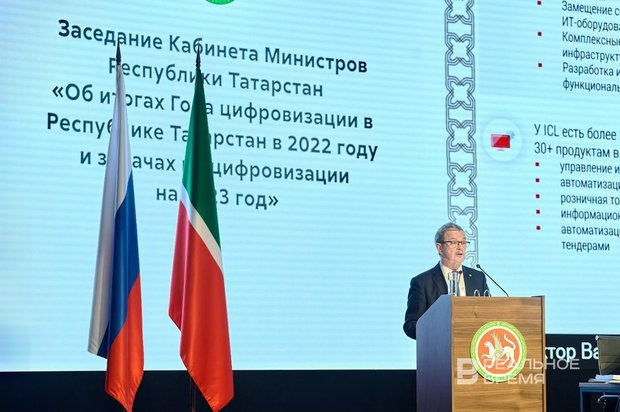
According to him, the company tried to join federal programmes to get preferential loans under 5 billion rubles during the year but didn’t manage: “We spent much time but didn’t manage to get the real support. Mr Khayrullin, I am asking to help us,” he addressed the minister. Diachkov noted that “preferential loans to develop import-substitution software can become a reality, and the process will speed up.”
The founder of ICL said that a motherboard plant with a capacity of a million units will be built this year. This will allow occupying 10% of the market in equipment production.
Head of the Tatarstan Association for Digital Development Rifkat Minnikhanov paid attention to the necessity of unifying new digital solutions to use them in one protocol. He says that new software are introduced without considering existing solutions, which is economically unfeasible.
There are millionaires among students, Rifkat Minnikhanov says
The head of the association continued talking on the theme and called upon being more careful about choosing contractors to modernise public information systems. He put an example of a case when specialists from Khabarovsk won a tender to modernise a complex system in four days, which was earlier developed by BARS Group from Kazan.
“This happened even if the republic of the republic set a task of developing the order of how non-republican companies are attracted to the creation, modernisation of public systems as early as 2020,” Rifkat Minnikhanov noted.
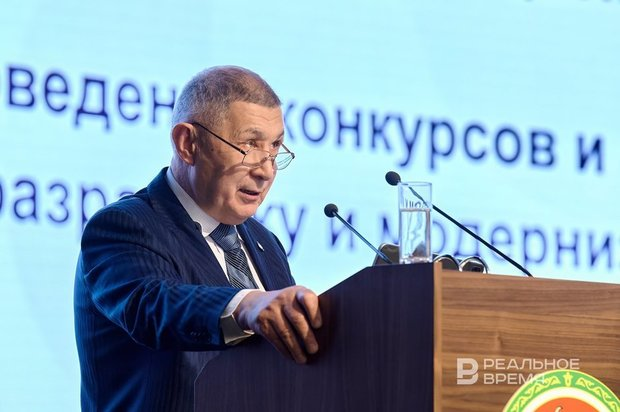
According to him, the result of the purchase hasn’t been achieved. He also mentioned the problem of university start-ups. Firstly, youngsters’ developments aren’t uploaded to the platforms: grants were distributed but there was no registry except for an Excel table, so there are a lot of millionaires among them. Secondly, some start-ups don’t have a commercial application and “far from real needs of the market.” Nevertheless, the third stage of the competition-based selection is going to be announced soon, while Innopolis and IT Park are to intensify the work in this area.
In conclusion, the Tatarstan president backed the Tatarstan producer that asked for federal preferential loans to develop Russian software.
“On the one hand, it is hard. On the other hand, all markets are open to us. Most importantly, there is ICL but it needs federal and our support,” Rustam Minnikhanov concluded.